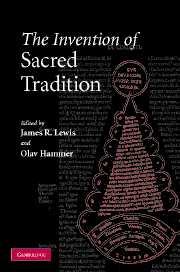Book contents
- Frontmatter
- Contents
- List of figures
- Notes on contributors
- Introduction
- 1 Scientology, scripture, and sacred tradition
- 2 “He may be lying but what he says is true”: the sacred tradition of don Juan as reported by Carlos Castaneda, anthropologist, trickster, guru, allegorist
- 3 The invention of sacred tradition: Mormonism
- 4 Antisemitism, conspiracy culture, Christianity, and Islam: the history and contemporary religious significance of the Protocols of the Learned Elders of Zion
- 5 The invention of a counter-tradition: the case of the North American anti-cult movement
- 6 “Heavenly deception”? Sun Myung Moon and Divine Principle
- 7 “Forgery” in the New Testament
- 8 Three phases of inventing Rosicrucian tradition in the seventeenth century
- 9 A name for all and no one: Zoroaster as a figure of authorization and a screen of ascription
- 10 The peculiar sleep: receiving The Urantia Book
- 11 Ontology of the past and its materialization in Tibetan treasures
- 12 Pseudo-Dionysius: the mediation of sacred traditions
- 13 Spurious attribution in the Hebrew Bible
- 14 Inventing Paganisms: making nature
- Index
- References
4 - Antisemitism, conspiracy culture, Christianity, and Islam: the history and contemporary religious significance of the Protocols of the Learned Elders of Zion
Published online by Cambridge University Press: 22 September 2009
- Frontmatter
- Contents
- List of figures
- Notes on contributors
- Introduction
- 1 Scientology, scripture, and sacred tradition
- 2 “He may be lying but what he says is true”: the sacred tradition of don Juan as reported by Carlos Castaneda, anthropologist, trickster, guru, allegorist
- 3 The invention of sacred tradition: Mormonism
- 4 Antisemitism, conspiracy culture, Christianity, and Islam: the history and contemporary religious significance of the Protocols of the Learned Elders of Zion
- 5 The invention of a counter-tradition: the case of the North American anti-cult movement
- 6 “Heavenly deception”? Sun Myung Moon and Divine Principle
- 7 “Forgery” in the New Testament
- 8 Three phases of inventing Rosicrucian tradition in the seventeenth century
- 9 A name for all and no one: Zoroaster as a figure of authorization and a screen of ascription
- 10 The peculiar sleep: receiving The Urantia Book
- 11 Ontology of the past and its materialization in Tibetan treasures
- 12 Pseudo-Dionysius: the mediation of sacred traditions
- 13 Spurious attribution in the Hebrew Bible
- 14 Inventing Paganisms: making nature
- Index
- References
Summary
“One of the most important forgeries of modern times.” In 1939 the French scholar of antisemitism, Henri Rollin, concluded that the Protocols of the Learned Elders of Zion was probably the most widely distributed book in the world after the Bible. Indeed, there are few languages, including Hebrew, into which it has not been translated. Moreover, “its distribution was accompanied by a mountain of secondary literature comprising well more than one thousand titles.” The Protocols is, as Norman Cohn has argued, “the supreme expression and vehicle of the myth of the Jewish world-conspiracy.” Pretending to be lectures, or notes of lectures, taken during twenty-four sessions of a congress held by representatives of “the twelve tribes of Israel,” the Elders of Zion, led by a Grand Rabbi – whom a later edition claimed to be the founder of modern Zionism, Theodore Herzl – it sets out a plot to take over the world and to subjugate gentiles. While not easy to summarize, the standard version of the Protocols expounds three principal themes: a critique of liberalism, an exposition of the methods by which Jews intend to take over the world, and an overview of the world government that the Elders of Zion intend to establish.
The work is “a slapdash patchwork composed of several earlier, unrelated writings” constructed as the Protocols by the Okhrana (the czarist secret police) and published in Russian newspapers during 1903 in order to strengthen the position of Nicholas II. However, while one might have expected such an obvious and ludicrous forgery to have quickly lost credibility, its combination of the twin motifs of conspiracy and anti-semitism quickly found eager believers and translators.
- Type
- Chapter
- Information
- The Invention of Sacred Tradition , pp. 75 - 95Publisher: Cambridge University PressPrint publication year: 2007
References
- 2
- Cited by



